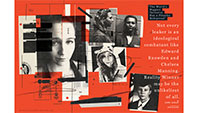 |
1. For New York, writer Mattathias Schwartz and photographer Matt Black spent weeks in Puerto Rico this fall documenting the devastation wrought by Hurricane Maria (“100 Days of Darkness,” December 25, 2017–January 7, 2018). BuzzFeed’s Matt Ortile wrote that “this week’s cover from New York is putting me through the wringer — heartbreaking photography with a quote up top that makes me want to vomit.” And Tallahassee mayor Andrew Gillum responded, “We need this administration to finally show some compassion.” Thomas J. Field, a spokesperson for the Army’s power-restoration task force in Puerto Rico — who was quoted in the story saying, “Just because you ask for something doesn’t mean you’re going to get it. FEMA has a responsibility to the taxpayer,” in response to an unfulfilled request to have a new generator delivered to Centro Médico — wrote to clarify the context of his comments: “The U.S. Army Corps of Engineers assessed the temporary power needs for Centro Médico on September 24, noting two of three generators were operational — while also receiving intermittent power from the existing grid providing sufficient power for critical infrastructure. The assessors determined generator requests would be better served in other facilities in need of emergency power, as there were limited generation resources on the island at the time. This prioritization was for life-saving, critical infrastructure with no power.” Lars Anderson, deputy chief of staff at FEMA for President Obama, added: “In Mattathias Schwartz’s article he is right to point out that the initial response by the Trump administration to assist Puerto Rico after Hurricane Maria was too slow. But as we’ve seen in various types of disasters, communities, first responders, and local organizations are most often the first to help those in need, not the federal government. The harrowing story of survival by the residents of Villa Calma that Schwartz describes epitomizes the idea of neighbor helping neighbor. But the goodwill shown in moments of crisis is not enough to make a community whole. The local organizations that bear the brunt of rebuilding need resources, and the meager pittance that has been provided thus far by the administration simply won’t get the job done. Communities themselves are the ones that will be there for the long haul, and we need to give them what they need to rebuild, not simply throw them a few paper towels.” This is the first feature story the magazine has also published fully in Spanish, and Representative Nydia Velázquez wrote, “Every American should read this article on what is happening to our fellow citizens in Puerto Rico — in both English and Spanish.”
 |
2. Kerry Howley profiled Reality Winner, an intelligence leaker unlike any we’ve seen before (“The World’s Biggest Terrorist Has a Pikachu Bedspread,” December 25, 2017–January 7, 2018). Edward Snowden tweeted, “If you’ve never heard the name Reality Winner, read this. If you already know who she is, reading this is even more important.” Peter Sunde, a co-founder of file-sharing website the Pirate Bay, wrote, “The story of Reality Winner makes me think of the Stasi. After the fall of the US surveillance state, we will look back at people like her, Snowden and Manning, asking ourselves how we let a state treat them this badly. And us as detainees and property.”